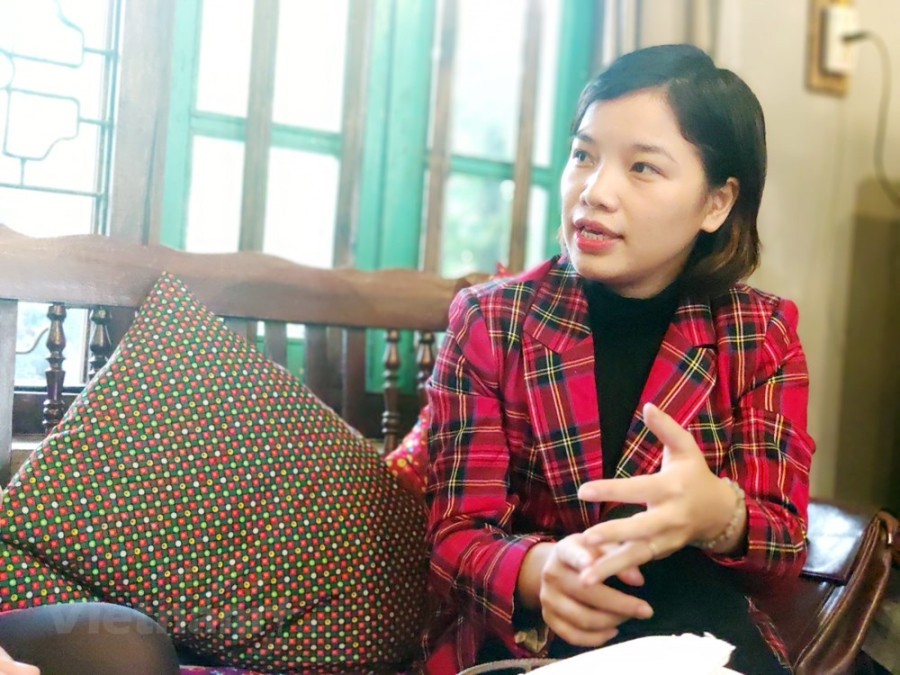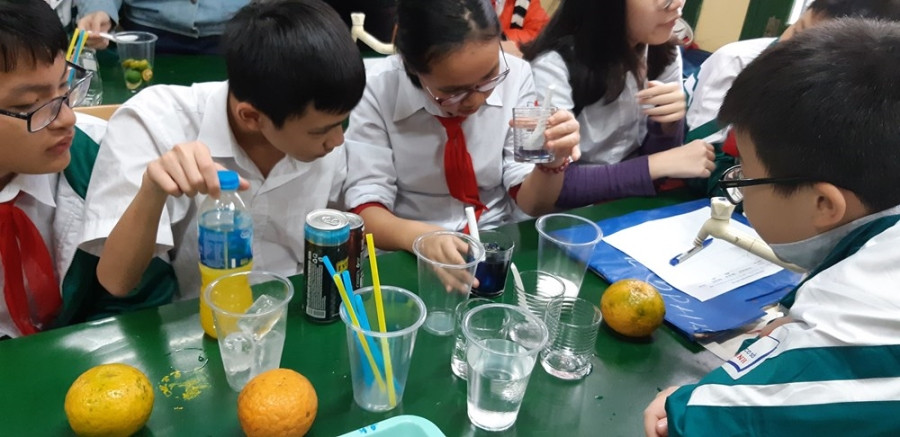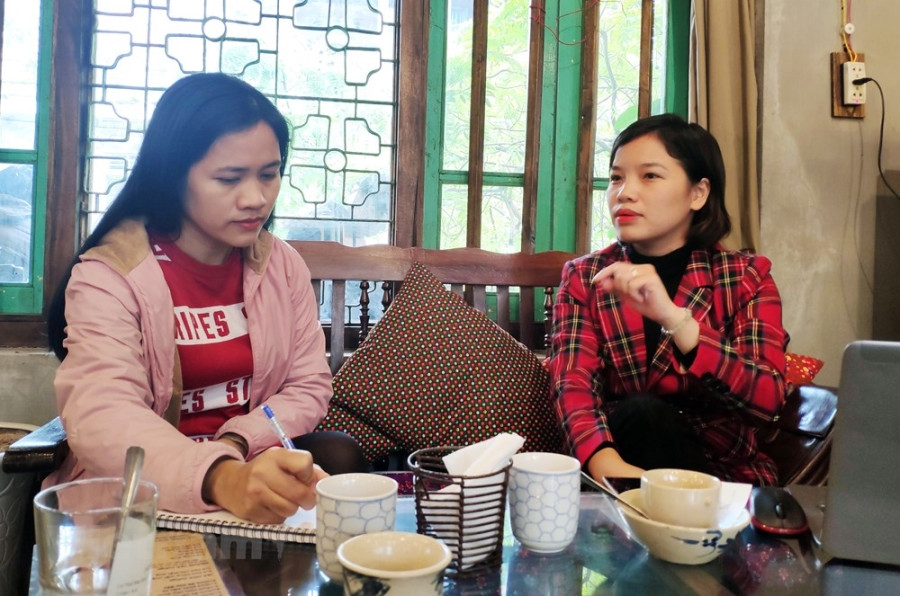Realizing that self-criticisms do not help students change but instead make them feel pressured and self-conscious, Ms. Quynh applied a method she learned from her colleagues abroad: Signing a behavioral contract.

Teacher Nguyen Thuy Quynh
Instead of asking students to write self-criticisms in the traditional way, which is not very effective in education, every time a student makes a serious mistake, Ms. Quynh will sit down with the student, analyze the cause, find specific solutions, and together sign a "behavioral contract" with clear terms like "strategic partners."
“The students were very surprised. They felt both happy and serious, and importantly, they felt respected and made an effort to change,” said Ms. Nguyen Thuy Quynh, a teacher at Hoang Mai Secondary School (Hoang Mai District, Hanoi).
She is also a teacher who is so passionate about STEM education that she reads a lot of documents, searches for and invests time and effort to attend STEM courses; she is one of the first teachers in Hoang Mai district to bring this new educational method to students.
Behavioral contracts with… rewards
With more than 10 years of experience, including many years as a homeroom teacher, Ms. Quynh said that it is normal for students to make mistakes. What she worries about most is how to make them understand that making mistakes is an opportunity to improve themselves and that they still deserve respect, trust, and motivation to change. “I did not find those things in the commonly used self-criticism or commitment. I decided to use the tool I learned from sharing with foreign teachers: a behavioral contract combined with an action improvement plan,” Ms. Quynh said.
Accordingly, every time a student makes a mistake, first of all, the teacher and students will sit down together so that she can listen to their sharing, find out the cause with the students and at the same time suggest to the students to see the consequences of that behavior. From the cause, the teacher and the students will determine measures to improve the behavior based on the actual conditions of the student's circumstances, personality, relationships, etc.
Instead of general promises not to repeat the offense in the old self-criticism, she will suggest that students point out specific things to do and include them in the terms of the “contract” with commitments to implement. What is special is that at the end of the contract, there is not only the effective time, the form of handling higher when students violate, but she also has regulations on small rewards to motivate students to correct their mistakes.
According to Ms. Quynh, the key to the success of the contract is that the teacher must truly understand the students' thoughts, handle mistakes with a calm attitude, ensure that students always receive respect, avoid subjective judgments and prejudices to gain their trust and willingness to share.
With her unique ways of doing things, Ms. Quynh has gained the trust of her students, thereby helping them to improve more and more. In the 2020-2021 school year, the principal entrusted her with being the homeroom teacher of two classes at the same time, one grade 7 and one grade 9, when a teacher of the school could not continue to be the homeroom teacher for personal reasons.
Bringing STEM to students
“Not only is Ms. Quynh a good homeroom teacher, she is also an excellent teacher, a pillar in the school's orientation towards developing STEM education,” said Ms. Chu Thi Xuan Huong, Principal of Hoang Mai Secondary School.

Ms. Quynh's students are passionate about STEM activities.
In 2019, realizing that STEM was a very positive educational method, Ms. Huong (then Principal of Tan Dinh Secondary School) suggested that teachers learn about it. From that suggestion, Ms. Quynh began to learn about STEM education and was immediately fascinated by this new educational method. She actively participated in STEM training courses organized by the school and the Department of Education and Training of Hoang Mai District, enthusiastically carried out scientific activities with students, and successfully organized the school's STEM Festival program.
Ms. Quynh still remembers that when the STEM Festival ended, she suddenly discovered a student sleeping in the corner of the lab. “He said that because he had been concentrating on STEM for the past few days, he only felt happy when he worked, not tired. Now that it’s over, he finally understood and fell asleep without realizing it. I was very touched and the student’s passion motivated me to try harder and make more efforts,” Ms. Quynh shared.
Not satisfied with the knowledge she learned, she searched for information on the Internet, joined STEM education groups, learned and paid for courses taught by experts in this field both domestically and internationally.
“From having a rather vague understanding of STEM, seeing STEM as quite far away from programming, robotics… the courses helped me understand STEM very closely, which is finding solutions to solve problems in daily life,” Ms. Quynh confided.
According to Ms. Quynh, the value of STEM education lies not only in the products students create, but more importantly in the implementation process of students, when they have to know how to work in groups, learn and use interdisciplinary knowledge, apply flexibly in practice, and know how to introduce their products. Therefore, even when they have not created a product, they still receive many lessons such as teamwork skills, presentation skills, thinking ability, problem-solving skills, situation handling skills, etc.

Teacher Nguyen Thuy Quynh (right) shares with the author of the article
She brought lively STEM lessons to students, helping them to be passionate about topics such as waste recycling, green energy, making safe drinks, building automatic watering systems, etc.
The positive effects of STEM education that Ms. Quynh brings have breathed new life into the school's education, motivating other teachers to be enthusiastic about educational innovation, creating excitement not only for students but also for parents.
“As a talented, enthusiastic teacher, at the peak of her career, Master Nguyen Thuy Quynh is truly an outstanding factor of the school. Recently, she was honored by the Hanoi Department of Education and Training as a dedicated and creative Hanoi Teacher. This is a worthy recognition for her efforts and dedication to the industry in the past time,” commented Principal Chu Thi Xuan Huong.
According to Vietnam+